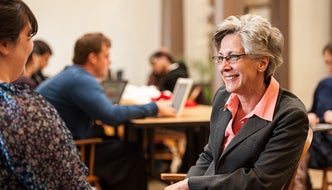
School of Humanities, Arts, and Social Sciences Dean Mary Simoni.
The School of Humanities, Arts, and Social Sciences (HASS), which was founded in 1957, “is a special community in an exceptional university at a critical moment in time, that sits at the crossroads of humanity and technological innovation,” according to Mary Simoni, who serves as dean of HASS.
Simoni is composer, author, teacher, pianist, consultant, arts administrator, and amateur photographer. Prior to joining Rensselaer in 2011, she served as associate dean of the University of Michigan School of Music, Theatre and Dance.
In this Q&A, Simoni offers her insight and answers questions on some ways that HASS contextualizes what it means to be a contributing citizen in an increasing complex technological society.
Q: What is the mission of your school?
A: The School of Humanities, Arts, and Social Sciences responds to the world’s greatest challenges with agenda-setting research on human societies, institutions, minds, arts, and culture. With outstanding undergraduate, graduate, and doctoral programs and a world-renowned faculty, HASS is home to an interdisciplinary and highly creative research community. The academic mission is to conduct research and offer degree programs that are rigorous, innovative, and responsive to the contemporary programs and prospects; and to equip all Rensselaer students with the skills and outlooks needed to address complex social issues in their lives as innovators and citizens.
Q: How does the HASS program connect to The New Polytechnic?
A: HASS is critical to The New Polytechnic in that we embody the values of liberal education at a STEM institution. Our effort in Art_X is a way to promote discovery at the nexus of the arts, magnified on a large scale with the STEM disciplines. It is this amazing intersection that contributes to knowledge and cultural production—the essence of The New Polytechnic.
Q: How should a prospective student prepare?
A: Read, read, read! Be curious about the world, the people of the world, and the way the world works. Take time to cultivate your imagination and creativity, as those are the talents that will contribute to personal resilience. Of course, follow a rigorous pre-collegiate curriculum and strive to get good grades. Take time to pursue a holistic approach to your extracurricular activities, including sports, music, and community service.
Q: What are some of the highlights of the HASS experience for undergraduates and graduate students?
A: Our programs are very unique in that they combine the essence of a liberal arts education at a science, technology, engineering, and mathematics (STEM) institution. Our students design and build prototype technologies, create video games, and compose and perform music. Students also have opportunities to perform at the Curtis R. Priem Experimental Media and Performing Arts Center or engage in research at the Center for Biotechnology and Interdisciplinary Studies.
Q: What is the role of the humanities, arts, and social sciences in the 21st century technological research university?
A: The answer is simple: We are seekers. We seek to understand the very nature of our humanity. We seek to improve the quality of life. We seek to preserve our world. We seek truth through artistic innovation. The School of Humanities, Arts, and Social Sciences is a special community in an exceptional university at a critical moment in time. We sit at the crossroads of humanity and technological innovation. We contextualize what it means to be a contributing global citizen in an increasing complex technological society. We concern ourselves with issues that have plagued humanity since the beginning of recorded history: ethics, truth, meaning, and beauty. At Rensselaer, we posit our contributions alongside the Schools of Architecture, Lally School of Management, Engineering, and Science as equal partners in the quest for understanding.
Q: What do you enjoy most about serving as dean of the school?
A: I learn something new every day! Whether it be from our students or our world-class faculty, I find it intellectually engaging to be on this campus as a dean.
Read the complete interview with Dean Mary Simoni.


